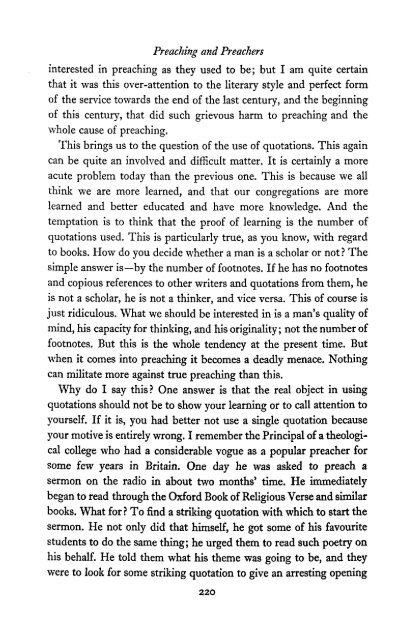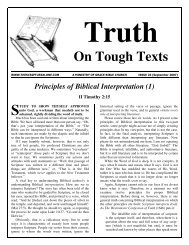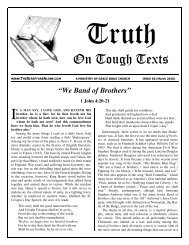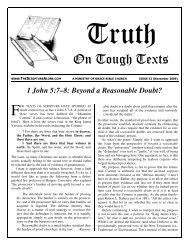- Page 2 and 3:
13th printingPreaching &Preachersby
- Page 5 and 6:
PREACHING AND PREACHERS
- Page 7 and 8:
PREACHING ANDPREACHERSbyD. MARTYN L
- Page 9:
To all the members of the Westminst
- Page 12 and 13:
ForewordIf there ever was a preache
- Page 14 and 15:
PrefaceI should have learned someth
- Page 17:
PREACHING AND PREACHERS
- Page 20 and 21:
Preaching and Preachersneed of prea
- Page 22 and 23:
Preaching and PreachersThis attitud
- Page 25 and 26:
The Primacy of Preachingpulpiteeris
- Page 27 and 28:
The Primacy of PreachingStill worse
- Page 29 and 30:
The Primacy of Preachingare interes
- Page 31 and 32:
The Primacy of Preachingthe same in
- Page 33 and 34:
ThePn'macy ofPreackt'ngchapter of t
- Page 35 and 36:
The Primacy ofPreachinggreat moveme
- Page 37 and 38:
No SubstituteWhat is it? Well, nega
- Page 39 and 40:
No Substituteassert that it is the
- Page 41 and 42:
No Substitutethe symptoms you can c
- Page 43 and 44:
No SubstituteThese proposals that w
- Page 45 and 46:
No Substitutedisputing or criticisi
- Page 47 and 48:
No Substituteargument today as 1 ha
- Page 50 and 51:
Preaching andPreachersthem and show
- Page 52 and 53:
Preaching and Preachershad come and
- Page 54 and 55:
Preaching and PreachersLet me tell
- Page 56 and 57:
Preaching and PreachersAs this is g
- Page 58 and 59:
Preaching andPreachersdestiny. In o
- Page 60 and 61:
Pretuhing andPreacher«essential be
- Page 62 and 63:
Preaching andPreacherswill be drive
- Page 64 and 65:
Preaching andPreachersI remember a
- Page 66 and 67:
Preaching and Preachersthe preacher
- Page 68 and 69:
Pretu:hing and Pretu:hersDaniel Row
- Page 70 and 71:
Preaching andPreachersman she descr
- Page 72 and 73:
Preaching andPreachenthat must be d
- Page 74 and 75:
CHAPTER FOURThe Form ofthe SermonWE
- Page 76 and 77:
Preaching andPreachersthis up later
- Page 78 and 79:
Preaching andPreacherscomment on th
- Page 80 and 81:
Preaching andPreachersparticular st
- Page 82 and 83:
Preaching andPreachersSo a sermon s
- Page 84 and 85:
Preaching and Preachersup and speak
- Page 86 and 87:
Preaching and Preachersyou are goin
- Page 88 and 89:
Preaching and Preachershave arrived
- Page 90 and 91:
Preaching andPreachersand used of G
- Page 92 and 93:
Preaching and Preachersmediated thr
- Page 94 and 95:
Precu:hing and Preacher«merely in
- Page 96 and 97:
Preaching and Preachersbecause I pr
- Page 98 and 99:
Preaching and PreachersHe is so mov
- Page 100 and 101:
Preaching andPreachersbe moved by i
- Page 102 and 103:
Preaching and Preacherspreacher doe
- Page 104 and 105:
Preaching and Preachersshows his em
- Page 106 and 107:
Preaching andPreachersTo sum it up,
- Page 108 and 109:
Preaching and Preachersthing I have
- Page 110 and 111:
CHAPTER SIXThe PreacherI WOULD REMI
- Page 112 and 113:
Preaching and Preachersconvert some
- Page 114 and 115:
Preaching and Preachersfalse view i
- Page 116 and 117:
Preaching andPreachersobsession, an
- Page 118 and 119:
Preaching and Preachersof the Acts
- Page 120 and 121:
Preaching and Preachersknowledge an
- Page 122 and 123:
Preaching andPreachersin his whole
- Page 124 and 125:
Preaching and Preacherson my advice
- Page 126 and 127:
Preaching andPreachersmessage. A ma
- Page 128 and 129:
Precuhing and Preachersalmost to th
- Page 130 and 131:
Preaching and Preachersthem, negati
- Page 132 and 133:
Preaching and Preachersmay remember
- Page 134 and 135:
Preaching and Preachersthem that th
- Page 136 and 137:
Preaching and Preachersbecause 1 th
- Page 138 and 139:
Preaching and Preacherswere talking
- Page 140 and 141:
Preachz'ng andPreachersthough I mig
- Page 142 and 143:
Preaching andPreachersspeak in the
- Page 144 and 145:
Preaching andPreacherspoint, incide
- Page 146 and 147:
Preaching and PreachersFor though I
- Page 148 and 149:
Preaching andPreachershad to correc
- Page 150 and 151:
Preaching andPreachershistory on th
- Page 152 and 153:
Preaching andPreacherspeople up int
- Page 154 and 155:
Preaching andPreachersan assessment
- Page 156 and 157:
Preaching andPreachersBut I must ad
- Page 158 and 159:
Preaching and Preachersof the churc
- Page 160 and 161:
Preaching and Preachersbenefit from
- Page 162 and 163:
Preaching and Preachers"the Church"
- Page 164 and 165:
Preaching and Preachershappening, y
- Page 166 and 167:
Preaching and Preachersblame will b
- Page 168 and 169:
Preaching and Preachersa Christian,
- Page 170 and 171:
Preaching andPreachersis but one th
- Page 172 and 173:
Preaching and Preachersspent in ord
- Page 174 and 175:
Preaching andPreachersLet me end th
- Page 176 and 177:
Preaching andPreachersdoes, or that
- Page 178 and 179:
Preaching andPreachersillustration
- Page 180 and 181: Preaching andPreachersthink it is-b
- Page 182 and 183: Preaching and Preachersof reading t
- Page 184 and 185: Preaching and Preacherswith regard
- Page 186 and 187: PretUhing and Preachersin the midst
- Page 188 and 189: Preaching and Preacherswhere scienc
- Page 190 and 191: Preaching and Preachersand they cou
- Page 192 and 193: Preaching and Preachersrelief for t
- Page 194 and 195: Preaching andPreachersamazing reaso
- Page 196 and 197: Preaching andPreachersis most impor
- Page 198 and 199: Preaching and Preachersthe people a
- Page 200 and 201: Preaching and Preacherswas my own d
- Page 202 and 203: Preaching and Preachersover-intelle
- Page 204 and 205: Preaching andPreachersto preach a r
- Page 206 and 207: Preaching and Preachersput down on
- Page 208 and 209: Preaching and Preachersone line and
- Page 210 and 211: Preaching and Preacherscrucifixion
- Page 212 and 213: Preaching andPreachersin this parti
- Page 214 and 215: Preaching and Preacherswhen the ver
- Page 216 and 217: Preaching and Preachersrelevance fo
- Page 218 and 219: Preaching and Preachersin your mind
- Page 220 and 221: Preaching and Preachersare beginnin
- Page 222 and 223: Preaching and Preachersused to enjo
- Page 224 and 225: Preaching and Preachersknow that th
- Page 226 and 227: Preaching and Preacherspractice was
- Page 228 and 229: Preaching and PreachersThe Puritans
- Page 232 and 233: Preaching and Preachersit comes to
- Page 234 and 235: CHAPTER TWELVEIllustrations, Eloque
- Page 236 and 237: Preaching and Preachersordinary tim
- Page 238 and 239: Preaching and Preachersthere are ex
- Page 240 and 241: Preaching and Preacherswell perhaps
- Page 242 and 243: Preaching and PreachersThat is pros
- Page 244 and 245: Preaching andPreachersand you shoul
- Page 246 and 247: Preaching and Preachersme one of th
- Page 248 and 249: Preaching and Preachersliterally tr
- Page 250 and 251: Preaching and Preacherswe produce r
- Page 252 and 253: Preaching andPreacherssermon? First
- Page 254 and 255: CHAPTER THIRTEENWhat to AvoidWE HAV
- Page 256 and 257: Preaching andPreachersA still more
- Page 258 and 259: Preaching and PreachersThis questio
- Page 260 and 261: Preaching and PreachersAs the vario
- Page 262 and 263: Preaching and PreachersThey are con
- Page 264 and 265: Preaching and Preachersanother has
- Page 266 and 267: Preaching and Preachersfinal undoin
- Page 268 and 269: Preaching andPreacherspeople listen
- Page 270 and 271: Preaching and Preachersindividual p
- Page 272 and 273: Preaching andPreachersa pronounced
- Page 274 and 275: Preaching and PreachersAbove all; d
- Page 276 and 277: Preaching and Preacherscentury end
- Page 278 and 279: Preaching and Preachersadoration an
- Page 280 and 281:
Preaching and Preachersso, they had
- Page 282 and 283:
Preaching and Preachersclearly, thi
- Page 284 and 285:
Preaching and Preacherspeople were
- Page 286 and 287:
Preaching andPreachersthat I would
- Page 288 and 289:
Preaching and Preachersbecause it h
- Page 290 and 291:
Preaching and PreachersFoul, I to t
- Page 292 and 293:
Preaching and Preachersappeal must
- Page 294 and 295:
Preaching and Preachersrepeatedly.
- Page 296 and 297:
Preaching and Preacherspreacher's c
- Page 298 and 299:
Preaching and Preachersto you yours
- Page 300 and 301:
Preaching and Preachersif there is
- Page 302 and 303:
Preaching and Preachersindividualit
- Page 304 and 305:
Preaching and Preachersman, 'Well,
- Page 306 and 307:
Preaching and Preachersthe pulpit t
- Page 308 and 309:
Preaching and Preachersand the peop
- Page 310 and 311:
Preaching and Preachersdevelop and
- Page 312 and 313:
Preaching and PreachersI had never
- Page 314 and 315:
CHAPTER SIXTEEN'Demonstration ofthe
- Page 316 and 317:
Preaching and Preachersshall he tur
- Page 318 and 319:
Preaching and Preachers(hey were al
- Page 320 and 321:
Preaching andPreachers3 and 5: 'Whe
- Page 322 and 323:
Preaching and Preachershe then deli
- Page 324 and 325:
Preaching andPreachersonly, but als
- Page 326 and 327:
Preaching andPreacherswas also a po
- Page 328 and 329:
Preaching andPreathersthem, of the
- Page 330 and 331:
Preaching andPreachersWhitefield te
- Page 332 and 333:
Preaching and Preachersnumber of co
- Page 334 and 335:
Preaching and PreachersThe power ca









